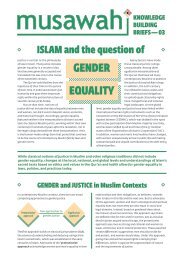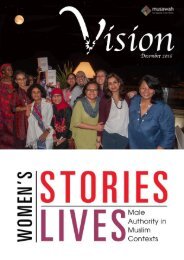You also want an ePaper? Increase the reach of your titles
YUMPU automatically turns print PDFs into web optimized ePapers that Google loves.
Suri: But why is Musawah a <br />
movement as opposed to, say a <br />
network ? <br />
Zainah: I think one major <br />
reason is that we see ourselves <br />
as a movement of ideas, a <br />
movement of knowledge. <br />
We looked at the Violence <br />
Against Women movement, and <br />
how they came out with a <br />
feminist analysis of why <br />
violence against women <br />
happens, what are the <br />
principles in the law if you want <br />
to criminalize domestic <br />
violence, what are the principles <br />
for providing shelter services. <br />
Nobody really owns that <br />
movement. All that scholarship <br />
is being produced, but it is really <br />
up to activists on the ground to <br />
decide how they would want to <br />
use it. <br />
So we looked at the VAW <br />
movement as a model and <br />
decided we wanted to produce <br />
the knowledge, the analyses, the <br />
strategies on how do we build <br />
an alternative discourse on <br />
equality and justice in Islam <br />
and how do we push for law <br />
reform: the arguments that <br />
make change possible. <br />
We wanted to develop that body <br />
of scholarship and we felt that in <br />
the end, it’s really up to groups <br />
at the national level to decide <br />
how they want to use our <br />
scholarship, the strategies we <br />
share at national levels. <br />
We see ourselves<br />
as a movement of<br />
ideas; a movement<br />
of knowledge.<br />
Rozana:There was a concerted <br />
effort to ensure that the agenda <br />
on the ground, at the national <br />
level is led by local groups, not <br />
us. They are the ones working <br />
on law reform while we help to <br />
support their efforts with <br />
knowledge resources and <br />
strategies that might be relevant <br />
to their efforts. <br />
Jana: One last thing to add is <br />
that the Jirst two years, from <br />
2007 until the launching in <br />
2009, were about principles <br />
and values. Our Framework for <br />
Action was originally called <br />
Declaration of Principles. <br />
There were i n t e n s e <br />
discussions about how do we <br />
formulate those values and <br />
principles so that they can be <br />
universal but then still apply to <br />
the different contexts. And I <br />
think that’s actually one of the <br />
things that Musawah, <br />
throughout the years, has <br />
continued to work on. <br />
Suri: Can you tell us a little bit <br />
about the planning process for <br />
the launch, especially for <br />
something as ambitious as a <br />
global movement? <br />
Rozana: Much work was done <br />
in terms of building the <br />
movement principles, values <br />
and resources but one other <br />
thing was reaching out to the <br />
groups of women working on <br />
law reform all over the world <br />
8




